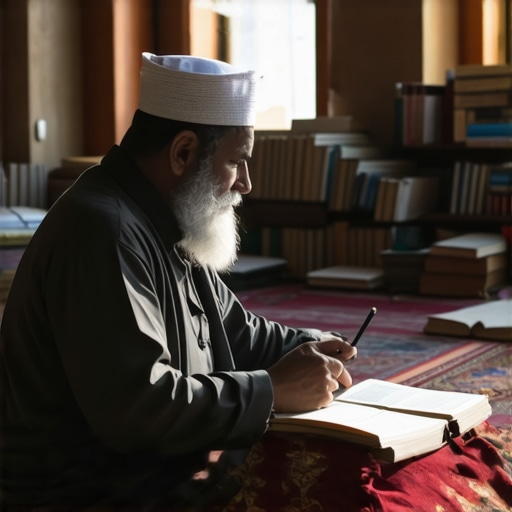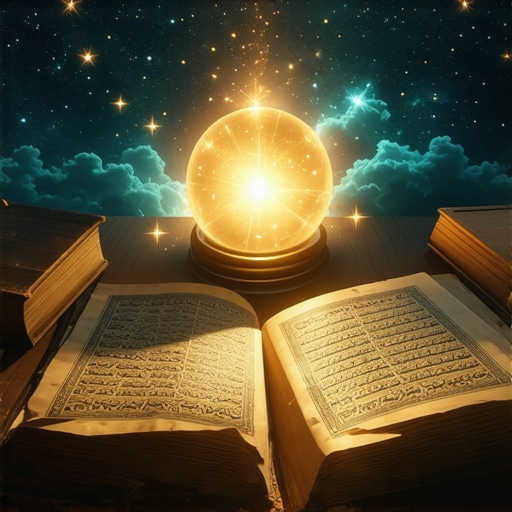My Journey into the Mystical World of Islamic Dream Interpretation
It all started when I experienced a vivid dream that seemed to hold a deeper meaning beyond the ordinary. As I delved into the teachings of Ibn al Qayyim, I discovered a treasure trove of wisdom that illuminated the sacred symbolism behind dreams. This journey transformed my understanding of how divine messages manifest through visions and symbols in Islam.
What Makes Dreams Sacred in Islamic Tradition?
In my personal exploration, I realized that dreams are considered a form of divine communication, especially when they contain clear symbols or messages. Ibn al Qayyim emphasizes that dreams can be divine hints or warnings, guiding believers on their spiritual path. The symbolism, whether it involves animals, colors, or objects, often carries profound meanings rooted in Islamic teachings.
Deciphering Dreams with the Wisdom of Ibn al Qayyim
One of the most fascinating aspects I uncovered was the interpretation of dreams about snakes. According to Ibn al Qayyim, such dreams can symbolize both danger and divine warnings, depending on the context. I found that exploring related resources, like the meaning of dreaming about a snake in Islam, adds valuable insight. Recognizing these symbols helps us understand divine messages tailored specifically to our spiritual journey.
How Do Sacred Symbols Shape Our Spiritual Insights?
From my experience, symbols like the Kaaba, stars, or even colors like green and black, serve as divine messages guiding us through life’s challenges. Ibn al Qayyim teaches that these symbols are not mere images but sacred signs that reveal divine wisdom if interpreted correctly. For instance, dreaming of the Kaaba might signify spiritual closeness or a call to prayer and reflection. These symbols act as spiritual milestones in our journey toward Allah.
What Are the Key Signs That Indicate a Sacred Dream?
Through my studies and personal reflections, I learned that clear, peaceful dreams—especially those that invoke feelings of reassurance or divine presence—are often considered authentic and sacred. Conversely, disturbing dreams may require reflection or spiritual cleansing. To deepen my understanding, I often revisit trusted sources like the Islamic dream dictionary by Ibn Sirin, which offers profound interpretations of various dream symbols.
If you’re curious about your dreams and their divine significance, I invite you to share your experiences or ask questions in the comments. Exploring dreams together can open pathways to divine guidance and spiritual enlightenment.
Decoding the Sacred Symbols in Islamic Dreams: What Do They Truly Signify?
One of the most captivating aspects of Islamic dream interpretation is understanding the profound symbolism embedded within visions. These symbols—ranging from animals and colors to celestial bodies—are believed to be divine messages tailored to guide believers on their spiritual journey. For instance, dreaming of the snake in Islam can symbolize warning or divine caution, depending on the context and the dreamer’s circumstances.
How Symbols Like the Kaaba and Stars Illuminate Our Spiritual Path
In my experience, sacred symbols such as the Kaaba, stars, or even specific colors like green and black, serve as divine signposts. These visions are not mere images but carry spiritual messages that reveal divine wisdom when correctly interpreted. For example, dreaming of the Kaaba often signifies spiritual closeness to Allah, a reminder of faith, or an encouragement to increase prayer and reflection. Recognizing and understanding these symbols can transform our spiritual insights into practical guidance, helping us navigate life’s challenges with divine support.
What Are the Indicators of a Truly Sacred Dream?
From my studies and personal reflections, I have found that dreams filled with tranquility, divine light, or feelings of reassurance tend to be authentic and sacred. These dreams often come with a sense of peace and clarity, distinguishing them from ordinary or disturbing visions. Conversely, dreams that evoke fear or confusion may require spiritual cleansing or seeking Allah’s protection through supplication. To deepen my understanding, I often consult comprehensive resources like the Islamic dream dictionary by Ibn Sirin, which offers detailed interpretations of diverse symbols and their divine significance.
How Can I Differentiate Between a Divine Dream and a Mere Reflection of My Subconscious?
This is a question I often ponder, as distinguishing divine messages from subconscious thoughts can be complex. According to Islamic teachings, a true dream often leaves a lasting, positive impact, accompanied by feelings of guidance and reassurance. It may also align with Islamic morals and values, leading to constructive actions or spiritual growth. Conversely, dreams stemming from the Nafs (inner self) or Shaytan tend to induce fear, confusion, or hopelessness. Engaging in prayer, supplication, and seeking knowledge from trusted scholars can help clarify the nature of such visions. For further guidance, exploring resources like Tafsir al-Ahlam can provide valuable insights into dream analysis within an Islamic framework.
If you are eager to explore your dreams further or share your experiences, I encourage you to comment below. Engaging in collective reflection can enhance our understanding of divine messages and deepen our spiritual connection, helping us recognize the sacred symbols that Allah uses to communicate with us on our spiritual path.
The Nuances of Sacred Symbols and Their Personal Significance
As I immersed myself deeper into the world of Islamic dream interpretation, I began to realize that each symbol carries layers of meaning that are not immediately apparent. For instance, dreaming of water might symbolize purity and spiritual cleansing, but it could also represent emotional overflow or divine mercy, depending on the context of the dream and the dreamer’s life circumstances. The interpretative process is akin to peeling an onion—each layer revealing more profound insights guided by divine wisdom.
How Do Personal Life Experiences Shape Dream Symbolism?
One fascinating aspect I encountered was how personal experiences influence the way I perceive symbols. For example, dreaming of a snake might evoke fear based on past encounters or cultural perceptions, yet in Islamic tradition, it can also symbolize divine caution or a warning. The key is to reflect on the dream within your current spiritual state and personal journey. This personalization makes dream interpretation a deeply individualized process, requiring both knowledge and spiritual sensitivity. For a more comprehensive understanding, exploring how personal experiences alter dream symbolism can be enlightening—such as understanding interpretations of dreams about losing teeth in Islam can offer insights into personal fears and spiritual transitions.
What Are the Ethical Considerations When Interpreting Sacred Dreams?
This question often crossed my mind: how do I ensure that my interpretations align with Islamic ethics and do not lead others astray? I’ve learned that humility is essential; recognizing that only Allah has full knowledge of divine messages keeps us grounded. When sharing interpretations, it’s vital to emphasize that dreams are personal and should be complemented with prayer and consultation with knowledgeable scholars. Respecting the sacredness of dreams and their potential to guide without overstepping boundaries is a nuanced skill that develops over time, much like cultivating patience and humility in faith. For further reflection, I recommend reading about Islamic perspectives on dream analysis ethics.
How Can We Cultivate a Spiritually Sensitive Approach to Dream Interpretation?
In my journey, I found that cultivating a state of inner calm and purity greatly enhances the clarity of divine messages in dreams. Practices such as sincere supplication, regular prayer, and maintaining a humble heart help create an environment receptive to divine guidance. It’s important to approach dreams not merely as puzzles to solve but as sacred messages that require reverence and mindfulness. This mindset transforms the interpretative process into a spiritual practice, deepening our relationship with Allah. Engaging with trusted resources like the works of Ibn al Qayyim can further enhance this sensitivity and understanding.
As I continue to explore this divine art, I invite you to share your own experiences or questions about sacred dreams. Together, our reflections can foster a richer understanding of divine signs and deepen our spiritual connection with Allah, who communicates with us through these sacred symbols in dreams.
Deciphering Sacred Symbols: Beyond the Surface of Islamic Dreams
As I continued my explorations into the rich tapestry of Islamic dream interpretation, I discovered that each symbol embodies a multifaceted meaning that often requires a nuanced understanding rooted in both spiritual insight and personal context. For instance, dreaming of water, which traditionally signifies purity and divine mercy, can also symbolize emotional turbulence or spiritual cleansing depending on the dream’s tone and personal circumstances. Recognizing these subtleties has profoundly deepened my appreciation for the interpretative process, transforming it into an art that integrates divine wisdom with personal reflection.
The Role of Personal Life Experiences in Shaping Dream Meanings
One of the most enlightening realizations in my journey has been how individual experiences influence the interpretation of symbols. A snake, for example, might evoke fear rooted in past encounters or cultural perceptions, yet within Islamic tradition, it can also serve as a divine caution or warning. This duality underscores the importance of contextualizing dreams within our current spiritual and emotional states. Engaging in sincere prayer and reflection helps me discern whether a symbol like a snake signifies a warning from Allah or a subconscious reflection of my fears. To deepen this understanding, I often consult comprehensive resources such as the interpretations of dreams about losing teeth in Islam, which provides profound insights into personal fears and spiritual transitions.
How Do Ethical Considerations Influence Our Approach to Dream Interpretation?
This question remains central in my practice: ensuring that my interpretations align with Islamic ethics and do not mislead others. I’ve learned that humility and the acknowledgment that only Allah possesses full knowledge of divine messages are essential. When sharing insights, I emphasize that dreams are deeply personal and should be complemented with prayer and consultation with knowledgeable scholars. Respecting the sacred nature of these visions and their potential to guide us ethically is a skill cultivated through patience and humility, much like nurturing one’s faith. For further guidance, I recommend exploring Islamic perspectives on dream analysis ethics.
Developing a Spiritually Sensitive Approach to Dream Analysis
In my experience, cultivating inner calm and spiritual purity enhances the clarity and accuracy of divine messages conveyed through dreams. Practices such as sincere supplication, consistent prayer, and maintaining a humble heart foster an environment conducive to divine guidance. Approaching dreams with reverence transforms the interpretative process into a sacred act that deepens my connection with Allah. To support this, I often study the works of scholars like Ibn al Qayyim, whose insights continue to refine my sensitivity to divine signs.

As I share these reflections, I invite you to explore your own dreams with a heart open to divine messages. Engaging in this sacred practice with sincerity and humility can unlock profound insights that guide us on our spiritual journey, reinforcing our faith and trust in Allah’s wisdom.
Things I Wish I Knew Earlier (or You Might Find Surprising)
The Power of Personal Reflection
One thing I wish I had understood sooner is how crucial personal context is when interpreting dreams. A symbol like water, which I once saw as just purification, can also represent emotional turbulence based on life circumstances. Recognizing this duality transformed my approach from a one-size-fits-all to a deeply personal process.
The Subtlety of Divine Signs
Initially, I thought only obvious symbols like the Kaaba or stars held divine messages. But over time, I realized that even small details, such as colors or feelings during the dream, carry sacred significance. This awareness has made my dream interpretations more nuanced and spiritually meaningful.
The Role of Inner Purity
Understanding that inner purity enhances the clarity of divine messages was a revelation. Regular prayer and sincere supplication create an environment where sacred dreams are more likely to communicate clearly, deepening my connection with Allah.
The Importance of Humility
I learned that humility is essential in dream interpretation. Only Allah knows the full meaning of divine signs, and approaching dreams with reverence prevents misguidance. This humility keeps my heart open to genuine guidance and prevents overconfidence in my interpretations.
Balancing Knowledge and Faith
While studying resources like the works of Ibn al Qayyim has been invaluable, I now understand that faith and sincerity are equally important. Combining scholarly knowledge with heartfelt prayer creates a balanced approach to understanding sacred dreams.
The Personal Journey of Spiritual Growth
Every dream is a step in my spiritual journey. Recognizing divine signs has encouraged me to reflect more deeply on my actions and intentions. This ongoing process has made my faith more vibrant and my life more aligned with Islamic principles.
Resources I’ve Come to Trust Over Time
- Islamic Dream Dictionary by Ibn Sirin – An essential resource that offers profound insights into dream symbols, helping me decode visions with confidence.
- Ibn al Qayyim’s Works – His deep understanding of Islamic spirituality has enriched my approach to dream interpretation and spiritual reflection.
- Exploring the Symbolism of Snakes in Islamic Dreams – A specific resource that shed light on one of the most complex symbols I encountered, deepening my comprehension.
- Islamic Perspectives on Dream Ethics – This guided me on how to approach dream interpretation ethically and responsibly, respecting its sacred nature.
Parting Thoughts from My Perspective
Reflecting on my journey, I realize that understanding the sacred symbols in Islamic dreams is a deeply personal and spiritual endeavor. It’s not just about decoding images but about opening our hearts to divine guidance. Embracing humility, sincerity, and personal reflection transforms dream interpretation into a meaningful act of faith. If this resonates with you, I’d love to hear your thoughts or experiences. Sharing our insights can strengthen our connection with Allah and help us recognize the sacred messages He sends through dreams. Feel free to leave a comment or reach out—let’s continue this spiritual exploration together.



Reading this post really resonated with my own journey of understanding dreams in Islam. I was initially skeptical about interpreting dreams, but learning from Ibn al Qayyim’s wisdom helped me see them as divine signs rather than random images. I recall a vivid dream where I saw the moon illuminating a dark path, which I now interpret as a reminder to seek knowledge and trust Allah’s guidance during tough times. The symbolism of celestial bodies being signs of divine guidance is something I’ve started to notice more in my own visions. I wonder, how do others differentiate between dreams that are truly divine and those influenced solely by personal fears or desires? It seems that creating a state of inner calm before sleep and praying for clarity can help discern these. Would love to hear more experiences from the community on recognizing authentic dreams and interpreting them responsibly.